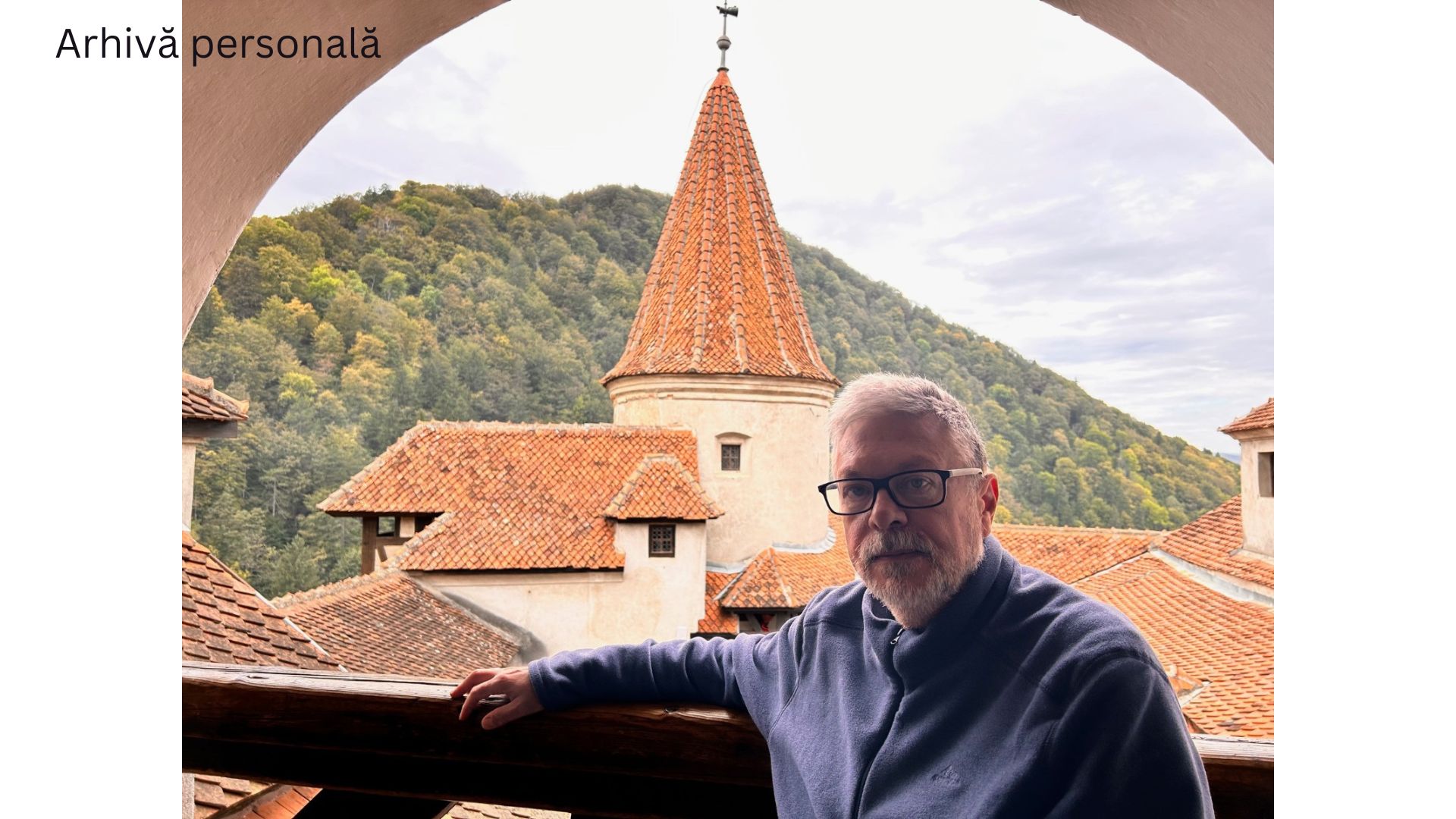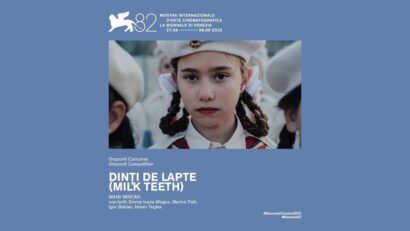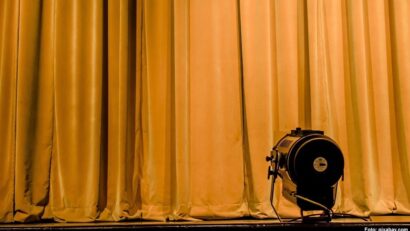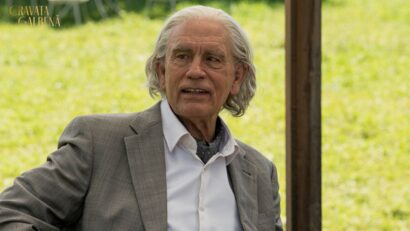Russian Writer Mihail Şişkin in Romania
Between September 25 and 28, Brașov was particularly lively

Юстина Бандол and Татьяна Кодреану, 25.10.2025, 13:20
Between September 25 and 28, Brașov was particularly lively, as the first edition of a new and ambitious literary festival, suggestively titled NOD, the knot, took place here. Proclaimed a “literary rights festival”, NOD brought together professionals from the written arts and the book industry – publishers, writers, literary agents, translators –, whom it invited to hold debates in a smaller or larger setting, often in front of the public. The festival also included a host of other events, from guest meetings with students to film screenings, poetry recitals, various workshops and autograph sessions. Among the guests of the organizers were renowned Romanian writers such as Bogdan Alexandru Stănescu, Simona Goșu, Cristian Fulaș, Dan Coman, Simona Antonescu or writer-director Cristian Mungiu, but also five important foreign writers translated into Romanian: Ukrainian Andrei Kurkov, Russian Mihail Şişkin, Swedish Linda Boström Knausgård, French Mathias Énard and American Edward Ashton.
Mihail Şişkin is known to Romanian readers especially through his titles Venus’ Hair, Scrivener – translated by Antoaneta Olteanu – and, more recently, My Russia, translated by Adriana Dănilă, all published by Curtea Veche Publishers. These books, unfortunately, are no longer for sale on the shelves of bookstores in Russia, where Mihail Şişkin was recently declared a “foreign agent”. Having left his homeland 30 years ago, he is a fierce critic of Vladimir Putin and his regime, and refused to return to Russia after the annexation of Crimea in 2014, although he is the only living writer to have received all the major Russian literary awards (Bolshaya Kniga, Russkii Buker and National Bestseller), has been translated into 30 languages, and is considered one of the most prominent representatives of contemporary Russian literature.
We asked Mikhail Shishkin if there is a continuity between his work as a novelist and his civic activism.
“There is a fundamental difference between literature and journalism. Literature is much too big a weapon to shoot at the dictators of our time. Because literature does not fight Putin, but all the evil in the world. You do understand the difference, yes? That is why you will never see any current politics in my novels. But you cannot sit and watch what is happening in silence either. When you are silent, it means that you support what is happening. For me, it is important to say “NO” to everything that is happening in Russia, because we are living in a war. And I am not naive to believe that through books, literature, art, music we can prevent or stop the war. Literature cannot stop the cannons. But it gives man hope that the world will not roll into hell, into the abyss. Because the Putins, Stalins, Hitlers come and go, but Bach, Beethoven remain, they will always be relevant. I would formulate the task of literature as follows: well, my novel cannot take a person out into the streets, onto the barricades, to say “NO” to war, only to be thrown into prison later. But if someone who reads it then thinks about his human dignity, the novel will influence him in some way – because in life the most important thing is not to get an apartment and buy a nice car, but to think about your human dignity. And what does that mean? What am I ready to sacrifice for the sake of my human dignity? Where is the limit to which I am ready to endure, to debase myself in this life, and when will I go out into the streets to defend my dignity? Only art, literature can make you think about this. And that is why my novels are weapons.”
Mikhail Shishkin also spoke to us about how he sees the role of literature in today’s world. “We cannot say that literature is some kind of panacea, that it can change the world… The world can be changed by only one thing – culture as a whole, education, the spread of knowledge. Over the past 200 … 300 years, the most important revolution of humanity has taken place, the transition from tribal to individual consciousness. And today a gap has opened between the population of Russia and evolved humanity. It is a gap in time. Because in Russia the majority of the population still lives in the past, with a tribal consciousness, identifies with their own tribe. But I already live with an individual consciousness. Only I alone decide what is good and what is bad, not my tribe, not the leader of my tribe. And the transition from tribal to individual consciousness is possible only through knowledge, through education, through culture, through literature. That is why any regime in Russia, any dictatorship will make culture its main enemy. How many schools Are there in Russia? Hundreds of thousands, no one has counted them. In every school there is a Russian language department, where a portrait of Tolstoy hangs on the wall. No teacher will put his quote “patriotism is a form of slavery” next to Tolstoy’s portrait. Because the only thing that culture should do for the regime is to raise patriots – that is, slaves. Slaves who will think that they are defending the homeland from enemies, but who will actually defend this dictatorship. Therefore, the main task of the regime is that there should be no education, no culture. From all of Tolstoy’s work, they will pick only the education of patriots. So, in Russia, to change this consciousness, the regime must first be changed. And there is no longer any peaceful means to change the regime. When the war against Ukraine began, I had hope that, finally, the whole world would unite and give Ukraine enough weapons to win on the battlefield. It is the only possibility to defeat Putin’s regime. And in the first months of the war it seemed that yes, the whole West would unite and help Ukraine. And what happened in the end? A betrayal. All democratic countries betrayed Ukraine. They betrayed me, they betrayed my personal struggle, my hope. This means that in Russia everything will remain as it is. Children will continue to be raised to be patriots. Look at what is happening now in schools, children are once again dressed in military uniforms and prepared to become cannon fodder. How can we prevent this?”
In 2024, the Dar literary prize (in translation: “gift”, after the name of the last novel written in Russian by Vladimir Nabokov) was awarded for the first time for authors who write literature in Russian, a prize established at the initiative of Mikhail Shishkin to support the translation into popular languages of Russian-speaking writers outside the official circuit of the Russian Federation. Even during the NOD festival, to the great bitterness of the guest, the Dar prize was also declared a “foreign agent” in Russia.
The latest book published by Mikhail Shishkin examines the relationship that the novelist has today with his cultural “fathers”, the great classics of Russian literature, in the context of the war in Ukraine. We are waiting for it to be translated into Romanian as well.






























